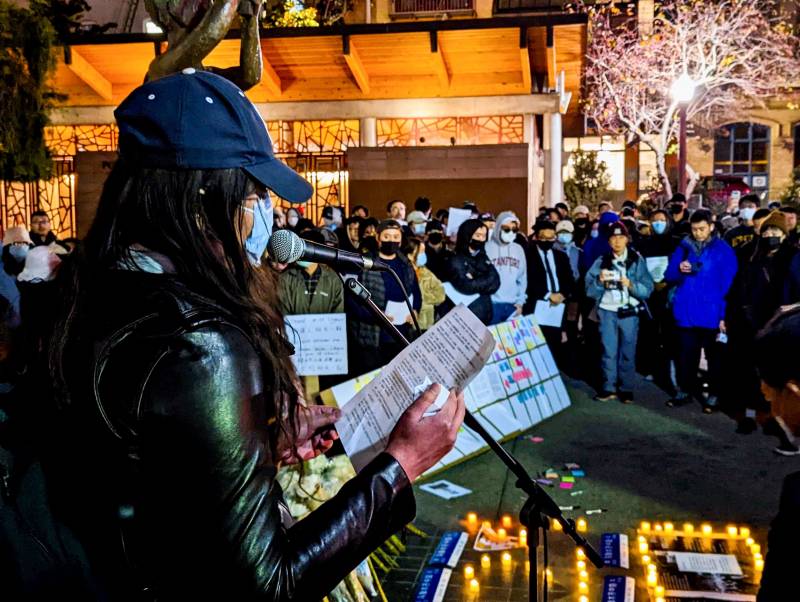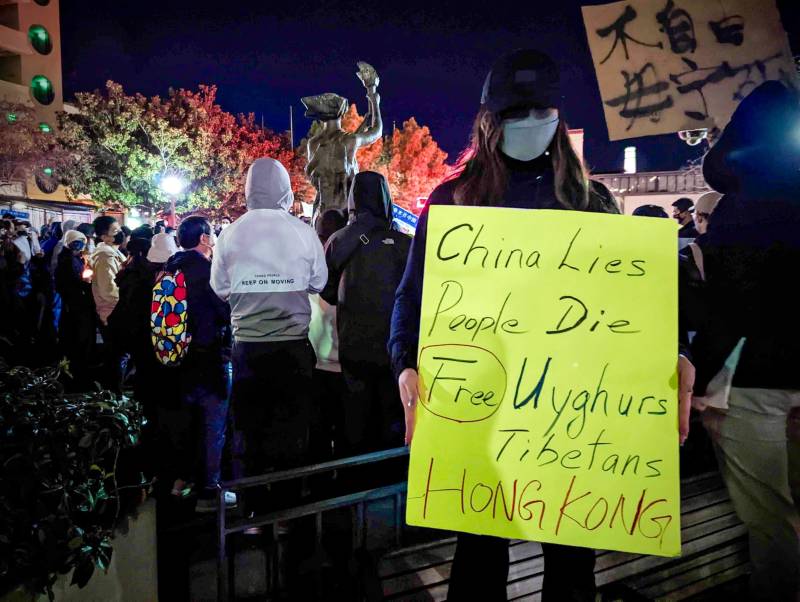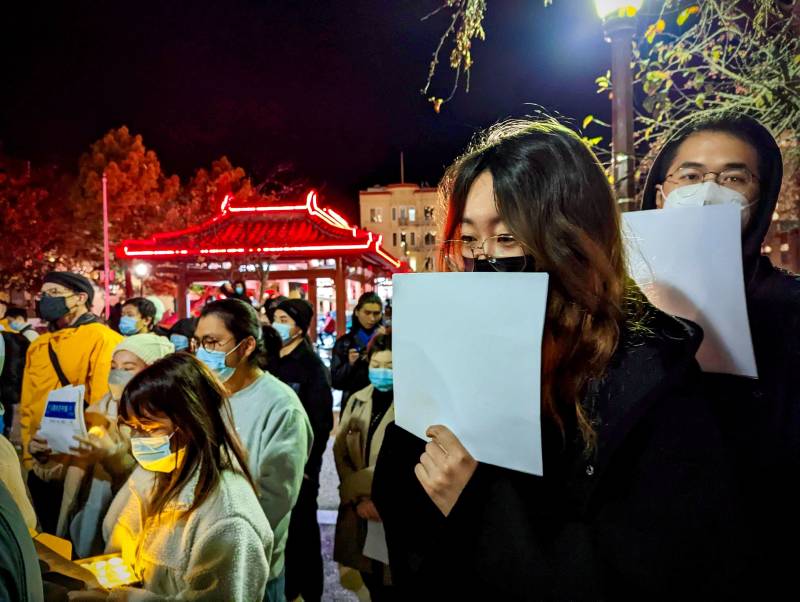A chorus of voices sang out at a vigil in San Francisco’s Chinatown on Tuesday night. Holding electric candles to the sky, mourners turned out by the hundreds to honor 10 who died in an apartment fire in Xinjiang, China, last week.
SF Chinatown Vigil Pushes Back Against China's Anti-COVID Lockdowns

“I know in life’s sorrow you are on the verge of drowning. May your tears flee with yesterday, blown away with the wind,” the Chinatown crowd sang, in Mandarin.
The song, “Tomorrow Will Be Better,” is a 1980s pop song similar in tone to John Lennon’s “Imagine,” which has been widely used by pro-democracy Chinese movements — appropriate then, as this vigil also pushed for political change.
The deaths of 10 ethnic Uyghurs in that apartment fire needn’t have happened, protesters in San Francisco and across the world claim. Reportedly, China’s zero-COVID policies were so strict that barriers meant to keep people quarantined inside barred emergency crews from quelling the deadly fire.
“It was horrifying. We’ve seen people scream, screaming people from the buildings. And there’s no, basically no way for them to escape,” said one protester in San Francisco, who spoke under condition of anonymity.
The protester is a student from China living in the Bay Area and said she joined the Portsmouth Square vigil because people “need to do something, as a human with sanity, to not just spread the truth, but also penetrate the lies the government has been telling everybody.”
She also feared for her own family, who remain in China and could be swept up not only in the government’s strict COVID quarantine methods, but in the Chinese government’s backlash against protesters, should she use her name publicly.
“It could be anyone. It could be my parents. It could be my uncle. It could be my friend’s parents. If I don’t feel for them now, that could be me. It’s just horrifying,” she said.
More than a dozen of the people KQED reporters spoke to declined to be interviewed, for fear of family, friends and loved ones who might face punishment from government actors back home in China. Even those who did agree to an interview did not wish to be identified by name, and will be quoted anonymously in keeping with KQED’s policy on granting anonymity.

“A lot of people that I know, or I don’t know, are still in jail for the time being for dissatisfaction with the current regime,” said John, a protester who would identify himself only by his first name when speaking to KQED.
Despite the risk, protesters in the Bay Area rallied in solidarity vigils from Berkeley to San José and San Francisco, joining a global call for China to ease its zero-COVID policy that has placed millions under lockdown and quarantine, limiting their access to food and medicine while ravaging the nation’s economy and severely restricting travel.
Those lockdowns have affected people in the Bay Area as well.
Edward Siu, who has owned a travel agency in Chinatown since 1981, said he lost 80% of his business giving tours in China amid the lockdowns. Federal and local funding has helped him keep the business open, but he’s burned through his savings, too.
“They have been hurting a lot of business for us, for the travel business, on the airline business, too,” Siu said.
Joyce Lam is an organizer with the Chinese Progressive Association. The organization’s members have said they’ve had trouble seeing family for three years in the face of strict quarantine lockdowns in China.

And they worry for their families back home for other reasons, too.
“We’ve had members share stories about their family who don’t even want to leave the house for fear of not just infection, but really what comes with infection,” Lam said. “In China, you would get a red code (in a COVID-monitoring phone app) and you would get quarantined for a long period of time. Your family, your entire building, essentially the community that you live in might be in quarantine when one person gets infected.”
The protests in China are notable for even existing in a country that arrests those practicing civil disobedience. Those China-based rallies have vocally mocked the government’s ever-changing line of reasoning, as well as claims that “hostile outside foreign forces” were stirring the wave of anger.
That was echoed in signage seen in the San Francisco protests. Some read, “China Lies, People Die,” and others featured splashes of red smeared across photos of Chinese President Xi Jinping.
Some change has already come in the days following the first protests: Two large cities in China, Guangzhou and Chongqing, announced Wednesday they would ease some COVID restrictions.
Following the largest street demonstrations in decades, by citizens fed up with strict anti-virus restrictions, China’s ruling Communist Party vowed to “resolutely crack down on infiltration.” A massive show of force by the security services Wednesday sought to deter further protests.
Advocates call it the “white paper revolution,” with protesters across the world, including at Portsmouth Square in Chinatown Tuesday night, holding up blank pieces of paper by candlelight to highlight the Chinese government’s restriction of any news about those protests, as well as its reported retaliation against those in China who even speak in support of the mass movement.
That fear of retaliation can hold back organizers in the Bay Area, said another anonymous protester, a tech-industry worker at the Chinatown vigil who feared reprisal against her family should she be identified.
“I hold all this fear in myself, and hope something happens. I hope the wave could be stronger, stronger, stronger, and some change actually happens,” she said. Being unable to speak out, she said, “my whole body is paralyzed. Like I couldn’t do anything. I feel like I was shocked and numb, and I was so angry, but I couldn’t speak.”
But perhaps even more frightening to her is that her family back in China believes what she believes to be government falsehoods. WeChat, a dominant social media app in China, is heavily monitored, the protester said, so she sees a lot of information about China’s COVID policies that her parents do not.
Media reports and video of the protests flourished online in China before being scrubbed by government censors. The rallies have been ignored entirely by the strictly controlled state media.
“I’m definitely worried about them. But the thing is, like, they won’t share bad news to me, and I’m not there,” she said. “It’s a ‘God bless us’ situation. The physical distance, there’s nothing I can do.”
As she spoke, the crowd began to sing behind her.
Being around her fellow protesters, she said, “I feel not lonely. Maybe me alone, I’m scared. But with them, I can feel more brave.”
The Associated Press contributed to this report.